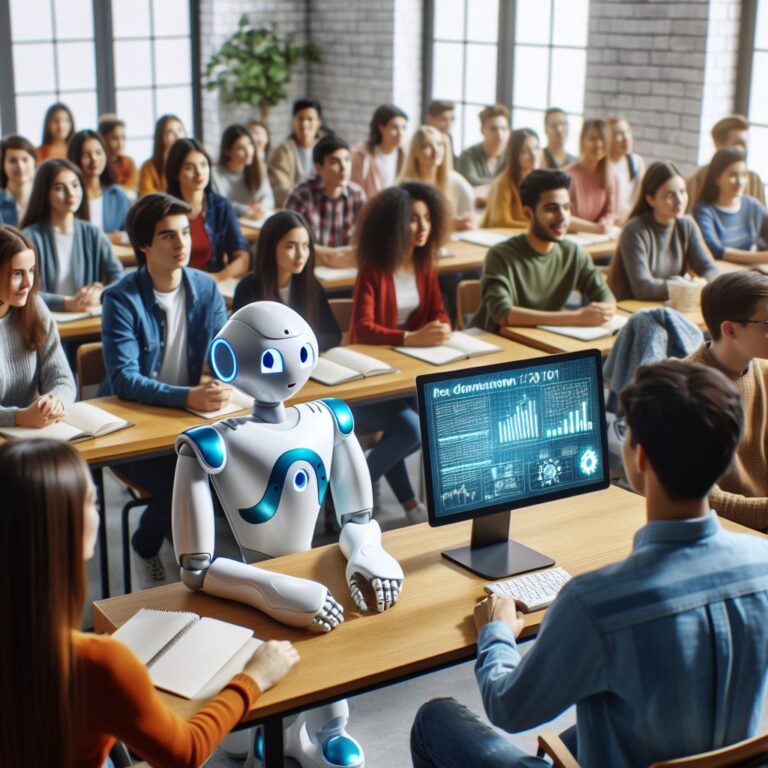The education landscape is undergoing a significant transformation, with artificial intelligence (AI) emerging as a powerful tool for enhancing learning experiences. Like a skilled gardener nurturing diverse plants, AI has the potential to personalize education, cater to individual needs, and cultivate a love for learning in students of all ages. However, similar to any new technology, AI in the classroom comes with its own set of challenges that need careful consideration.
The Promise of AI: Personalized Learning and Beyond
One of the most exciting aspects of AI in education is its ability to personalize learning. Imagine a classroom where each student receives tailored instruction and support based on their unique strengths, weaknesses, and learning pace. AI-powered platforms can analyze student data, including performance on quizzes, assignments, and even facial expressions, to identify areas where they excel and areas that require additional support.
For example, consider a student struggling with complex math concepts. An AI tutor could present the material in different ways, using interactive simulations, visual aids, or even gamified learning experiences, until the student grasps the concept. This individualized approach can not only improve academic performance but also boost student engagement and motivation.
AI’s potential extends beyond personalized learning. It can automate time-consuming tasks such as grading essays, freeing up valuable teacher time for more interactive activities like leading discussions and providing one-on-one guidance. Additionally, AI can assist in creating engaging learning materials, translating languages for diverse classrooms, and providing immediate feedback on student work.
Just like a compass guiding explorers in the right direction, artificial intelligence can offer real-time feedback, allowing students to adjust their learning strategies and identify areas for improvement on the fly. This continuous feedback loop fosters a deeper understanding of the material and promotes self-directed learning.
Addressing the Challenges: Ethical Considerations and Human Connection
While the potential benefits of AI in education are undeniable, it’s crucial to address the challenges and ethical considerations associated with this technology. One major concern is bias in AI algorithms. If the data used to train these algorithms is skewed, they could perpetuate existing biases and disadvantage certain groups of students. It’s essential to ensure that artificial intelligence tools are developed and implemented in a way that promotes fairness and inclusivity for all learners.
Another critical aspect to consider is the human element of education. While AI can offer valuable tools and support, it cannot replace the irreplaceable role of teachers. The human connection in the classroom, characterized by empathy, creativity, and critical thinking skills, is vital for fostering a love for learning and nurturing well-rounded individuals.
Therefore, AI should be seen as a complementary tool that empowers teachers, not replaces them. Teachers can leverage the capabilities of AI to personalize learning, provide immediate feedback, and manage administrative tasks, allowing them to dedicate more time to individual student support and fostering a positive learning environment.
Comparing artificial ıntelligence to a powerful microscope used in scientific research is insightful. While the microscope allows scientists to see details invisible to the naked eye, it doesn’t replace the scientist’s expertise and ability to interpret the data and draw conclusions. Similarly, AI can provide valuable data and insights, but it cannot replace the teacher’s professional judgment and human touch in the classroom.
The Road Ahead: Responsible Implementation and Continuous Learning
As AI continues to evolve, it’s crucial to adopt a responsible approach to its implementation in education. This includes ensuring data privacy and security, addressing potential biases, and fostering open communication between educators, parents, and students about the use of artificial intelligence in the classroom.
Furthermore, continuous learning is essential for both educators and students in the age of AI. Educators need to be equipped with the necessary skills and knowledge to effectively leverage AI tools and ensure their responsible integration into their teaching practices. Students, on the other hand, need to develop critical thinking skills to analyze information, identify potential biases, and understand the limitations of AI-generated content.
In conclusion, AI holds immense potential to transform the education landscape, but its successful integration requires careful consideration of both the benefits and challenges. By harnessing the power of AI responsibly and ensuring it complements, not replaces, the human element of education, we can create a future where learning is personalized, engaging, and accessible to all.
Check out more articles like this at Education Archives – Topic In One Article
